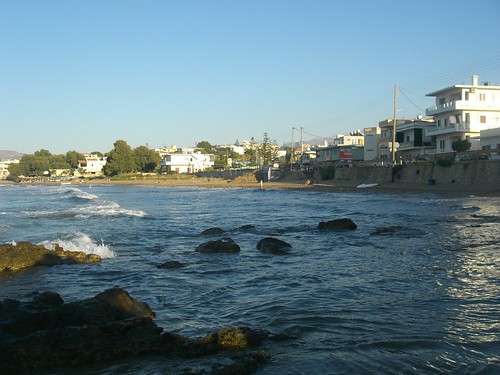It's back to work today for the regular working Greek, but not for a couple of dozen among us, who have been spending the last two nights in jail or wondering how to avoid inevitable arrest.


«Hail to the leader» yelled the wife (also an Golden Dawn MP, like her husband) and 25-year-old daughter, as their husband and father was transferred to court. «Darling, you made a mockery of them» said the wife. «Dudders, my dudders» said his daughter.
I am relieved that the half dozen in particular who are MPs will not be showing their forever smirking faces in Parliament today. Their presence was simply to taunt, to disgrace, to curse, to bring thier street agort into a sacred institution. There will be many out there who will argue that the Greek Parliament was full of criminals anyway, but there were none like Golden Dawn. Even those who are touted as criminals know how to keep their dignity. The Golden Dawn bunch had no inkling of that - their racist stance was written all over their ugly faces, as was their murderous anti-establishmentarianism.
I am very proud to know that in the Greek police force, there is a 24-year-old policewoman who went against all the stereotypes of the Greek police force on the day that she immobilised a murderer just moments after he executed someone: she cannot have been colluding with Golden Dawn, as has been implied about the Greek police for so long. In fact, she was doing her job, and very well for that matter. She is the reason why Golden Dawn is now in jail. It was not just the death of a citizen that triggered everything; if it weren;t for her actions, instinctively apprehending someone as they were caught in the act, then it would not have been possible for everyone else to take their turn: the police and politicians were then able to bypass the privacy laws and find out who the murderer was talking with on his mobile phone. Thanks to 21st century advanced technology, everything happened very quickly after that, and we are where we are now.
I am very proud to know that in the Greek police force, there is a 24-year-old policewoman who went against all the stereotypes of the Greek police force on the day that she immobilised a murderer just moments after he executed someone: she cannot have been colluding with Golden Dawn, as has been implied about the Greek police for so long. In fact, she was doing her job, and very well for that matter. She is the reason why Golden Dawn is now in jail. It was not just the death of a citizen that triggered everything; if it weren;t for her actions, instinctively apprehending someone as they were caught in the act, then it would not have been possible for everyone else to take their turn: the police and politicians were then able to bypass the privacy laws and find out who the murderer was talking with on his mobile phone. Thanks to 21st century advanced technology, everything happened very quickly after that, and we are where we are now.
Politics is a stinky business. I spent a highly political two days last week heavily involved in food politics, and I know how easy it is to rush to conclusions and to make judgments. In the end we resorted to the old cliches to hide our disappointment when we realised that our hard work would not be taken into account to reach a fair decision: show patience, don't give up hope, believe in yourself, support your colleagues and continue to work as a team. And above all, keep smiling and don't show anyone how crushed you feel. The events of the past weekend in Greece remind me of those two days in my life, where a lot of work was put into a project, which did not yield the favourable outcome that we were hoping for (our ultimate goal).
But it made us all realise just how powerful we were at that moment when we showed what we could do, and the potential for a future success if we continue to keep a united front and work as a team. I am proud to have played a part in serving to that purpose. At the end of the day, I am very proud to be able to say that I did my job, just like that young female police officer.
©All Rights Reserved/Organically cooked. No part of this blog may be reproduced and/or copied by any means without prior consent from Maria Verivaki.
















 "
"



























